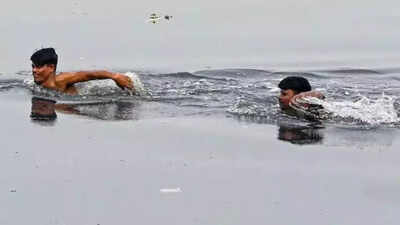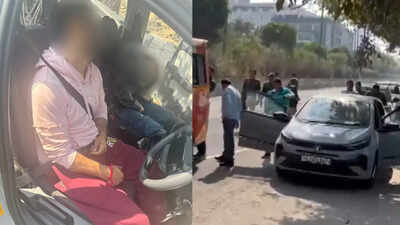Where no one goes: Inside Delhi’s death dive squad; 102 bodies pulled out from waterbodies this year till now | Delhi News

NEW DELHI: In the filth-clogged drains and toxic canals of Delhi, a bare-bodied brigade of 15 divers pull out the capital’s dead—drowned, dumped or disappeared. They dive without gear, without gloves and without complaints, pulling out bloated corpses from open drains, battling suffocating foam in polluted rivers, snake bites and the unbearable stench of decay. In the first six months of 2025, these men have pulled out 102 bodies from the capital’s water bodies. May alone accounted for 32 recoveries, 27 of them from a single canal in northwest Delhi’s Bawana.Based out of a boat club in Civil Lines in north Delhi, this 15-member team responds to calls from Delhi Police, Delhi Fire Service and National Disaster Response Force — calls that often mean a suicide, a drowned child or a murdered body stuffed in a gunny bag that needs to be retrieved. The calls come from across the capital, from Jaitpur and Kondli to Najafgarh Drain, Bhalswa Lake, the Asola Bhatti mines in Chhatarpur, Model Town Lake and the full 45-km stretch of the Yamuna. They often get calls from the Haiderpur Water Treatment Plant, where bodies flowing in the Munak canal usually get trapped.These divers enter drains filled with rotting garbage and dead animals. “We don’t open our eyes underwater. It’s too dirty, the chemicals and the dirt sting,” revealed Shabir Ahmed, who has been diving since he was 15 years old. “So we shut our eyes and feel our way forward. If we touch something, we just hope it’s not a dead animal or a sharp object. And if it’s a body, we hold on tight.”For over a decade, almost half his life, Ahmed has started his day the same way: leaving home at sunrise to report to the boat club of the DM (east) office at Civil Lines. Every time Harish, the man in charge of the club, gets a call, it signals the same grim prospect of a body in water. Without delay, a team of divers rush to the scene, aiding police and grieving families in recovering those lost to the waters. The team also has 12 motorboats, three paddle boats and a manual boat.The divers enter the water in nothing but their undergarments. There are body suits but most of the divers don’t wear them. When asked, why they go bare bodied given the risks, a diver simply said, “Ab aadat ho gayi hai (We’re used to it).” Bhola explained, “They don’t fit well and we can’t swim well wearing them as it restricts movement or gets stuck or caught in the garbage.” Another young diver reiterated, “It sounds strange, but body suits don’t work for us, they feel heavy and restrict movement. These drains have everything, glass shards, meat waste, liquor bottles. We’re used to it by now.”But some hazards are far worse. In narrow canals or near bridge pillars, divers themselves get trapped due to suction currents. Snake bites during summers are also common. Sometimes, a body has decomposed so badly that its limbs break off during recovery. “Sometimes, when you try to tug the body, the arms or legs come off in your hands,” said Deep Singh, who’s been at the job since he was 10. “There are dives when you come up gasping and nearly faint.“Ahmed added, “The white foam created by chemicals looks harmless in Yamuna pictures, but it’s like rubber. It clogs your nose and sticks to your skin. Once you’re in, it’s tough to breathe, and even harder to get back out. The only way to clear it is to go over it with a boat and splash water, or call the fire department. But until that’s done, the foam suffocates you.”Harish added, “There’s always a risk — nets, barbed wires or something sharp underwater. But we never say no. Even during Diwali or Holi, we’re on standby.” Last year, his teams pulled out 232 dead bodies from various waterbodies in the city.Most of these divers were raised on the Yamuna floodplain. Kushal, who now manages a team, said, “This has been our life for generations. My grandfather did it, my father did it, now I do. We all grew up in the jhuggis on the floodplain. Our families once raised flowers and vegetables on this land. But the river water is too polluted now. Govt has banned farming, so diving is our only livelihood.”A 26-year-old diver added, “We learned by watching our fathers and uncles dive into the river. This isn’t a job we chose, it’s what we’ve always done. Now, even if we want to do something else, we wouldn’t know how to.”Each body retrieval is a story of risk. But for the divers, the mission remains the same: to bring someone’s son, daughter, parent or sibling back to the surface, for closure, for final rites, for peace.





